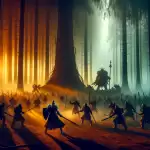Apologies for the delay in updating the blog! I recently acquired a new 3D printer and have been thoroughly engrossed in printing miniatures, bases, and terrain--in addition to being super busy with a new role at work. As a result, I haven't had as much time to dedicate to this portion of the hobby lately. However, I'm excited to share my latest experiences and insights with you all.
As a dedicated Kings of War player and a father of two aspiring wargamers, I found myself facing the challenge of building three armies without breaking the bank. That's when I discovered the incredible potential of 3D printing for our beloved hobby. If you’re new to Kings of War, it’s a miniature-agnostic game: while Mantic loves for you to use their minis, you can use anything you’d like, which opens the door to 3D printing. In this post, I'll share my journey and provide insights on how you can harness the power of 3D printing to enhance your Kings of War experience.
Getting Started with 3D Printing

My foray into 3D printing began with the purchase of an Elegoo Mars 2 printer. This basic and affordable option, priced at just $250 when I bought it and now priced at $120, delivered outstanding results. I quickly learned that the choice of resin plays a crucial role in the durability of the printed miniatures. I highly recommend using Ameralabs TGM-7 or mixing in SirayaTech Tenacious for enhanced resilience. Without using a specialty resin, prints can be fairly brittle and break somewhat easily. I subsequently upgraded to a Saturn 3 Ultra 12k for the large build plate. It’s been wonderful, though I have had slightly more quality issues than with my trusty Mars 2.
Note that 3D printing requires a dedicated space due to safety considerations. I don’t want to overstate the toxicity of resin, but you should treat it similar to something like bleach: it’s not going to kill you in small doses, but you also don’t want to be bathing in it or breathing it all day long. I set up a grow tent in my basement with external ventilation to ensure proper PPE and a safe printing environment.
Cost-Effective Army Building

One of the most significant advantages of 3D printing for Kings of War is the cost savings. A single bottle of resin, costing between $25 and $30, can easily print an entire army that would otherwise retail for $300 to $500. The initial investment in a 3D printer quickly pays for itself, allowing you to expand your collection without breaking the bank.
I've found great success in obtaining miniature files through Patreons. Two of my favorites are Titan Forge and Highlands Miniatures. Additionally, Mantic's Vault has been an invaluable resource, offering legitimate models at a mere $5 per month subscription.
Bases and Terrain: A Different Approach
While resin printing excels at producing miniatures, bases and terrain require a different approach. Resin prints can have slight dimensional inaccuracies, which can be frustrating when dealing with precise measurements like 100x80 bases. For scatter terrain, resin printing is still viable, but larger pieces are better suited for FDM (Fused Deposition Modeling) printing, which uses melted plastic.

I recently invested in a Bambulabs P1S printer, and after a few weeks of use, I can confidently say it has revolutionized my terrain and base production. Filament is significantly less expensive than resin, allowing me to create an abundance of high-quality terrain pieces and bases to enhance my Kings of War gaming experience. I wish I had picked one up sooner!
Embracing the Learning Curve
Venturing into the world of 3D printing for Kings of War does come with a learning curve. However, the rewards of customization and the ability to bring your unique vision to life make it well worth the effort. With dedication and practice, you'll soon be creating stunning armies, bases, and terrain that will elevate your gameplay to new heights.
Conclusion
3D printing has transformed the way I approach Kings of War, enabling me to build multiple armies cost-effectively and craft personalized terrain pieces. By sharing my experiences and recommendations, I hope to inspire fellow Kings of War enthusiasts to explore the incredible potential of 3D printing. Embrace the learning curve, unleash your creativity, and watch your tabletop come alive like never before.
Have you tried 3D printing for Kings of War? Share your experiences and tips in the comments below!


